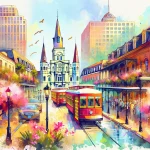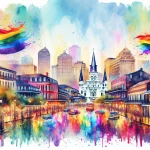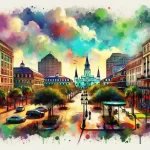New Orleans, a city on the Mississippi River, is celebrated for its rich musical legacy and thriving live music scene. From the emergence of jazz in the early 1900s to the yearly New Orleans Jazz & Heritage Festival, the city’s musical soul continues to captivate visitors and locals alike. With a variety of genres, including jazz, blues, R&B, funk, and zydeco, New Orleans offers an unparalleled experience for music enthusiasts.
In This Article
TL;DR
- New Orleans is the birthplace of jazz and remains a vibrant hub for live music across various genres.
- The New Orleans Jazz & Heritage Festival is a major annual event showcasing local and international performers.
- Music clubs, street performances, and cultural celebrations keep the city’s musical spirit alive throughout the year.
Jazz: The Heartbeat of New Orleans
New Orleans is widely regarded as the birthplace of jazz, a genre that emerged in the early 20th century from the city’s African American communities. Pioneering musicians like Louis Armstrong, Sidney Bechet, and Jelly Roll Morton developed their distinctive styles in the city’s neighborhoods, blending elements of blues, ragtime, and marches. Today, jazz clubs like Preservation Hall, Snug Harbor, and The Spotted Cat keep the tradition alive with nightly live performances featuring both local and visiting artists.
Preservation Hall, situated in the French Quarter, is a must-visit for jazz aficionados. This historic venue, which has been hosting traditional jazz concerts since 1961, offers intimate performances by some of the city’s most respected musicians. Shows run nightly at 5:00 PM, 6:15 PM, 8:00 PM, and 9:15 PM, with tickets ranging from $20-$50.
Jazz Funerals and Second Line Parades
Jazz funerals are a unique New Orleans tradition that honors the deceased with music and celebration. These processions typically begin with a somber march led by a brass band, followed by a more upbeat “second line” parade where mourners and onlookers join in the dancing and revelry. Second line parades also occur on Sundays and special occasions, featuring brass bands and dancing crowds winding through the city’s streets. These traditions showcase New Orleans’ resilient spirit and the central role of music in its cultural identity.
New Orleans Jazz & Heritage Festival
The New Orleans Jazz & Heritage Festival, affectionately known as “Jazz Fest,” is an annual multi-weekend event that takes place at the Fair Grounds Race Course. The festival features a diverse lineup of local and international artists performing across multiple stages and tents, attracting hundreds of thousands of visitors each year. In addition to music, Jazz Fest celebrates Louisiana culture with food booths offering regional specialties, craft vendors, and cultural exhibits.
Notable performers at past Jazz Fests have included icons like Duke Ellington, Ella Fitzgerald, Stevie Wonder, and Bruce Springsteen. The festival showcases various genres beyond jazz, including blues, R&B, gospel, Cajun, zydeco, and rock. The 2024 Jazz Fest is scheduled for April 26-28 and May 2-5, with tickets ranging from $80 for a single-day pass to $1,600 for a VIP experience.
Live Music Venues and Nightlife
New Orleans boasts a thriving live music scene, with numerous venues showcasing local and visiting artists. Frenchmen Street, located in the Marigny neighborhood, is a hub for live music clubs, with popular spots like The Spotted Cat, Snug Harbor, and d.b.a. These intimate venues offer nightly performances across various genres, from traditional jazz to contemporary funk and brass bands.
Tipitina’s, a legendary Uptown venue, has been hosting local and national acts since 1977 and is known for its funk and jazz performances. The Maple Leaf Bar is another iconic Uptown spot, famous for its long-running weekly shows by the Rebirth Brass Band. Both venues offer a mix of ticketed and free shows, with cover charges typically ranging from $10-$20.
Street Performances and Busking Culture
Street performances are a common sight in the French Quarter and other neighborhoods, with musicians, dancers, and artists entertaining passersby. Jackson Square is a popular spot for buskers, with brass bands, solo musicians, and other performers drawing crowds throughout the day. The city’s busking culture reflects its deep appreciation for live music and the role of artists in the community.
Visitors can enjoy impromptu performances by wandering through the French Quarter, particularly along Royal Street, where buskers often set up in the afternoons and evenings. Tipping street performers is encouraged, as many rely on donations to support their craft.
Mardi Gras and Music
Mardi Gras, the annual Carnival celebration, is deeply intertwined with New Orleans’ musical traditions. Mardi Gras parades feature marching bands, brass bands, and dance troupes performing throughout the city. The Mardi Gras Indians, African American tribes known for their elaborate costumes and chants, are a unique aspect of the city’s Carnival music scene.
Mardi Gras balls, hosted by Carnival krewes, often feature live musical performances and dancing. Many krewes have their own signature songs or anthems performed during their parades and events. The Zulu Social Aid & Pleasure Club, one of the oldest and most famous African American krewes, is known for its lively music and dance performances.
Other Notable Music Festivals and Events
In addition to Jazz Fest and Mardi Gras, New Orleans hosts several other music festivals and events throughout the year. The French Quarter Festival, held each April, is a free multi-day event showcasing local music, food, and culture. The Essence Festival, a celebration of African American culture, features major R&B, hip-hop, and soul artists performing at the Superdome. Satchmo SummerFest, held in August, honors the legacy of Louis Armstrong with live jazz performances, seminars, and exhibits.
Preservation and Promotion of Musical Heritage
Several organizations in New Orleans work to preserve and promote the city’s musical heritage. The New Orleans Jazz & Heritage Foundation supports local musicians and cultural traditions through education, archiving, and community outreach programs. The New Orleans Jazz Museum, located in the Old U.S. Mint building, offers exhibits, performances, and resources exploring the history and influence of jazz.
Local radio stations like WWOZ play a vital role in supporting and broadcasting New Orleans music to a wider audience. The station’s “Livewire Music Calendar” provides a comprehensive listing of live music events happening throughout the city.
New Orleans’ vibrant music scene is a testament to the city’s rich cultural heritage and the enduring spirit of its communities. From the birth of jazz to the annual celebrations of Jazz Fest and Mardi Gras, music remains the heartbeat of the Crescent City, drawing visitors from around the world to experience its unique sounds and traditions. By supporting local musicians, venues, and cultural organizations, New Orleans ensures that its musical legacy will continue to thrive for generations to come.






